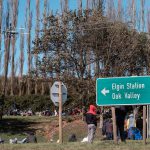Addo citrus workers accuse farmers of abuse
The Sundays Valley farmers’ association has denied the accusations of abuse levelled by the local farm workers’ forum in the Eastern Cape, despite what workers say they have experienced.
Author:
12 August 2019

The Sundays River Valley in the Eastern Cape is home to the Addo Elephant National Park, which is internationally renowned for its hundreds of elephants. They, together with giraffes and lions, roam the fences along the roadside against a picturesque backdrop of thousands of orange trees. But the people working on some of these neighbouring citrus farms say that life is far from idyllic. They claim they are verbally and physically abused, given no protective clothing, transported like cattle in trucks and even sprayed with pesticides from the air.
At a recent meeting hosted by the Sunday’s River Valley Farm Worker’s Forum in the Addo town of Kirkwood, farm workers discussed their working conditions.
The forum, which covers farm workers from 80 farms in the area, shot to prominence last year when it organised a successful strike by citrus workers. The strike eventually achieved a minimum wage of R20 per hour, valid from June 2018 until June 2020. This was an increase of more than R3 an hour on the wages they were earning at the time and is higher than the government’s minimum wage for farm workers.
But at the meeting, Sunset Farm, which trades as Tortello Investments No. 20, came under the spotlight when workers from the farm said the owner was circumventing paying them their stipulated minimum wages.
Diminished hours
A group of workers said they came to work for Tortello Investments No. 20 as seasonal workers from April to October on the premise that they would work nine-hour days, five or six days a week. But they have ended up being offered only three to four hours of work a day, earning just R60 on some days, and say they cannot survive on this amount.
One farm worker says: “If we complain, our days will get even shorter. We are told to just take any cent he gives us or leave. The farmer says he doesn’t want people saying that he robs the workers.”
Related article:
The seasonal workers’ living expenses are pushed up because the farm does not offer accommodation. They are compelled to rent shacks in the area, which cost about R200 a month. The distance between the farm and the nearby shack settlements necessitates transport and the farmer charges them R5 a trip, twice a day.
Vuyisile Sikani, the co-ordinator of the Sunday’s River Valley Worker’s Forum, and Mildred Mayo, an executive member of the forum, described the cut in their working hours as “financially disastrous”.
Mayo claims that: “White people take advantage of migrant farm workers because they believe that farm workers from other countries don’t know their rights. This farmer even blamed the South African farm workers. He told the Zimbabweans that he gave them less hours because the South African farm workers didn’t want them to work here. That is not true. We want all workers to be treated the same.”
No protection, unsafe transport
Sikani says workers are not provided with protective clothing and that about 48 workers are transported to and from the farm each day in an open truck. He claims that the farmer implements aerial crop dusting while the workers are picking the oranges, exposing them directly to pesticides.
“That plane sprays chemicals all over us. We don’t even know what that is, but it gives us a rash and then we get sick and after that we get tuberculosis,” says one of the farm workers, who asked to remain anonymous.
Another adds that workers often fall off the rickety stepladders supplied for them to use while picking oranges, and that they encounter snakes. “Farmers just don’t care,” says Mayo, recounting the story of a worker on another farm who fell while picking oranges and was impaled through the cheek on a sharp, broken piece of stepladder. She received no medical help from the farmer, according to Mayo.
Related article:
The Sundays River Valley area is just 72km from Nelson Mandela Bay. The roads between the farms are long and dusty. “That truck is far too small for all of us, but the farmer does not care,” says one of the farm workers from Zimbabwe.
Sikani says the forum has emailed the Sunset Farm owner a list of concerns, but he had not replied at the time of publication.
New Frame called the farm to speak to the owner. A woman, who identified herself as the manager but declined to give her name, said she had replied to Sikani’s letter “through the proper channels” but would not say what these channels were. “I am perfectly happy to say no comment. This has nothing to do with the press,” she said.
According to the forum, the situation in which the workers from Tortello Investments No. 20 find themselves is common in the Sundays River Valley and Addo areas. Generally, workers are not encouraged to pursue their labour rights and face dismissal if they raise any objections to malpractices, the forum says.
“Farm owners don’t have the correct approach,” says Sikani. “They dismiss workers all the time, telling the workers, ‘There is the gate. Just go, go, go.’”
Mayo adds that there is a general level of verbal abuse from many farmers in this area. “The farmers here still use the k-word on workers, even while they know that this word has been forbidden since 1994. They think we cannot do anything and that we don’t know our rights.”
Endemic abuse of farm workers
Teresa Connor, a senior researcher at the University of Fort Hare’s Institute for Social and Economic Research, has studied farm workers and displacement in the Sundays River Valley.
She says “there are many workers with health problems due to poisoning. The issue with immigrants is that they are often illegal or clandestine immigrants, and do not have the necessary permits. Farmers may often take advantage of this by offering them substandard wages or bad conditions, knowing that they cannot report this to the authorities.”
Hannes de Waal, the manager of farmer association the Sundays River Citrus Company, disputes the farm workers’ statements, saying that 40% of the citrus in the valley is exported to European Union countries, which have strict guidelines around pesticide use.
Related article:
“You cannot pick oranges while someone is spraying the same crop. You spray and then you have relief periods. The chemical has to break down properly before food is available for human consumption. Our approach is very biological and we only spray what we have to spray. Farmers spray at night mostly because the wind also tends to die down and there is nobody in the orchards,” he says.
He claimed farmers would not transport workers in overcrowded trucks. “Workers will complain today about being transported on the back of a truck, but the next day [they will] refuse to go on a bus, and the next day ask to use the truck to go to a soccer match. This is South Africa. Sometimes communication is quite complicated,” he says.
De Waal said it is legal to transport workers on the back of an open truck if there is space for them to sit down. “But the problem is that they stand up by themselves as soon as we turn our backs because they like it. I have one farmer here whose workers are refusing to use a bus.”
Sikani said he and other activists have been objecting to overcrowded and unsafe transport for years, and that a key demand in last year’s strike was for farmers to hire local taxi companies to transport workers safely. He added that it was common for farmers to deny any allegations of abuse. “These farm owners who are abusing the workers will always deny everything, even while we have the evidence,” he said.



